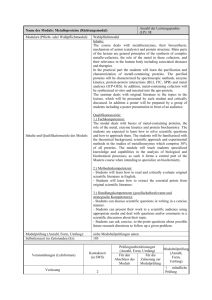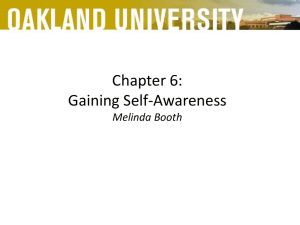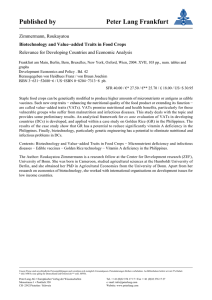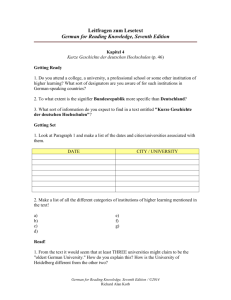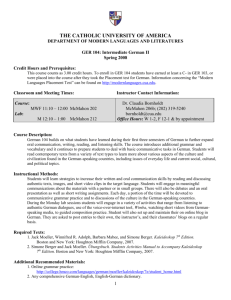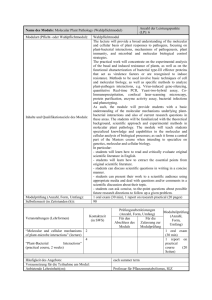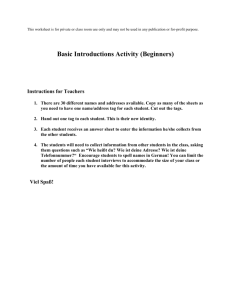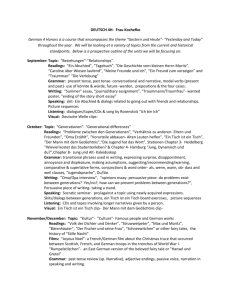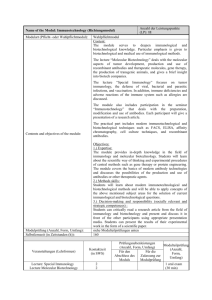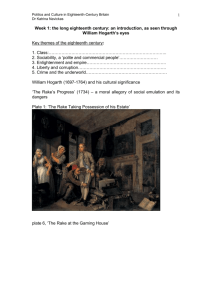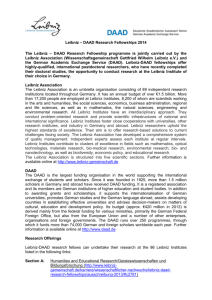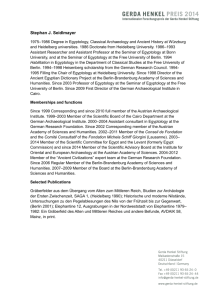Jeanne Schueller, UW-Madison, WAFLT 2014 Du bist, was du isst
advertisement
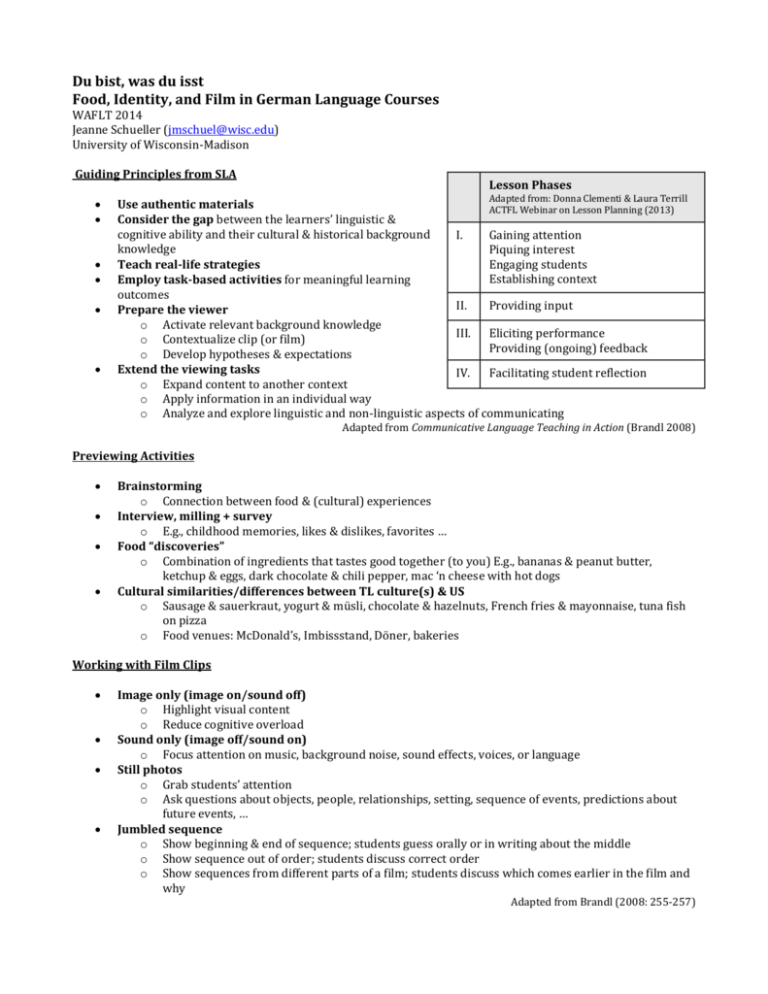
Du bist, was du isst Food, Identity, and Film in German Language Courses WAFLT 2014 Jeanne Schueller (jmschuel@wisc.edu) University of Wisconsin-Madison Guiding Principles from SLA Lesson Phases Adapted from: Donna Clementi & Laura Terrill Use authentic materials ACTFL Webinar on Lesson Planning (2013) Consider the gap between the learners’ linguistic & cognitive ability and their cultural & historical background I. Gaining attention knowledge Piquing interest Teach real-life strategies Engaging students Establishing context Employ task-based activities for meaningful learning outcomes II. Providing input Prepare the viewer o Activate relevant background knowledge III. Eliciting performance o Contextualize clip (or film) Providing (ongoing) feedback o Develop hypotheses & expectations Extend the viewing tasks IV. Facilitating student reflection o Expand content to another context o Apply information in an individual way o Analyze and explore linguistic and non-linguistic aspects of communicating Adapted from Communicative Language Teaching in Action (Brandl 2008) Previewing Activities Brainstorming o Connection between food & (cultural) experiences Interview, milling + survey o E.g., childhood memories, likes & dislikes, favorites … Food “discoveries” o Combination of ingredients that tastes good together (to you) E.g., bananas & peanut butter, ketchup & eggs, dark chocolate & chili pepper, mac ‘n cheese with hot dogs Cultural similarities/differences between TL culture(s) & US o Sausage & sauerkraut, yogurt & müsli, chocolate & hazelnuts, French fries & mayonnaise, tuna fish on pizza o Food venues: McDonald’s, Imbissstand, Döner, bakeries Working with Film Clips Image only (image on/sound off) o Highlight visual content o Reduce cognitive overload Sound only (image off/sound on) o Focus attention on music, background noise, sound effects, voices, or language Still photos o Grab students’ attention o Ask questions about objects, people, relationships, setting, sequence of events, predictions about future events, … Jumbled sequence o Show beginning & end of sequence; students guess orally or in writing about the middle o Show sequence out of order; students discuss correct order o Show sequences from different parts of a film; students discuss which comes earlier in the film and why Adapted from Brandl (2008: 255-257) Jeanne Schueller, UW-Madison, WAFLT 2014 Analyse des Trailers Welche Eindrücke und Stimmungen vermittelt der Trailer? Welche Personen werden gezeigt und was erfahren wir über ihre Beziehungen zueinander? Was erfahren wir über die Themen und die Handlung des Films? Ein Plakat analysieren Welche Figuren/welches Motiv werden abgebildet? In welcher Beziehung stehen die Figuren zueinander? Was erzählt das Plakat über den Inhalt des Films? Was erfahren wir über die Hauptfiguren? Welche Farben dominieren? Was symbolisieren die Farben evtl.? Wie wird der Filmtitel graphisch abgebildet? Macht der Filmtitel neugierig auf den Film Was verrät er über die Handlung? Verdeutlicht das Plakat ein bestimmtes Filmgenre? Wenn ja—welche Genremerkmale sind erkennbar? Welche Stimmung wird vermittelt? An welche Zielgruppe richtet sich das Plakat? Weckt das Plakat Interesse an dem Film? Standbilder beschreiben/vergleichen Erklären Sie kurz, was in diesen Szenen passiert, wie die Figuren sich in jeder der hier dargestellten Szenen fühlen, und welche Themen oder Motive sich auf diese Fotos beziehen. Eine Geschichte zum Standbild erfinden Expansion Activities & Student Reflection Write a story in which you describe how ______ (a food dish) was first discovered/made. Research food trends in the target culture. How are they similar or different from your own culture? What do these trends reveal about the target culture? About cultural products, practices, and perspectives? Interview a native German speaker about childhood memories associated with food, such as rituals, traditions, etc. Interview a student who has studied abroad in Germany, Austria, or Switzerland about his/her impressions of the food, practices, and personal food-related experiences while abroad, or foods they missed from home. Report to the class on any of these topics (presentational language use). Student Project Ideas Create a menu for a fictitious restaurant Review & critique a food-related German film Review a German cooking show/episode Review area restaurants/food carts Cook meals related to the films Videotape a cooking show “episode” Videotape a news report of a food-related crime Videotape a “missing” scene from a movie Videotape a trailer for one of our movies Dub an excerpt of cooking show into German Jeanne Schueller, UW-Madison, WAFLT 2014 Food-related Feature Films Anleitung zum Unglücklichsein (2012) Dir. by Sherry Hormann Bella Martha (2001) Dir. by Sandra Nettelbeck Bon Appetit (2011) Dir. by David Pinillos Die Entdeckung der Currywurst (2008) Dir. by Ulla Wagner Es muss nicht immer Kaviar sein (1961) Dir. by Géza von Radványi Kebab Connection (2005) Dir. by Anno Saul Kebab mit Alles (2011) Dir. by Wolfgang Murnberger Pommes essen (2012) Dir. by Tina von Traben Salami Aleikum (2009) Dir. by Ali Samadi Ahadi Solino (2002) Dir. by Fatih Akin Soul Kitchen (2009) Dir. by Fatih Akin Sushi in Suhl (2012) Dir. by Carsten Fiebeler Documentaries Essen verändert die Welt (2013) Dir. by Regine Lettner Oma und Bella (2012) Dir. by Alexa Karolinski Taste the Waste (2010) Dir. by Valentin Thurn Sources & Additional Resources Leitfragen zur Filmanalyse (© A.Thiele 8/2007) http://www.produktive-medienarbeit.de/projektarbeit/video/lernmaterialien/leitfragen.shtml Methoden der Filmarbeit (Bundeszentrale für politische Bildung (bpb) & VisionKino 2012) http://www.kinofenster.de/download/methoden-der-filmarbeit.pdf Deutsche Welle “So isst Deutschland” (videos, images, texts) http://www.dw.de/so-isst-deutschland-eine-unterrichtsreihe/a-5638156 Filme sehen lernen: Grundbegriffe der Filmanalyse (PPT) (Peter Schott, Goethe Institut Nancy) http://www.goethe.de/ins/fr/pro/cineallemand/pdf_cineallemand3/Grundbegriffe%20der%20Filmanalyse.pdf Glossar zur Filmanalyse (Eric Horn) http://www.horn-netz.de/seminare/filmanalyse/filmanalyse-glossar.pdf Filmkritik (Carmen Breitenbach)—for younger students http://bildung-rp.de/fileadmin/user_upload/schulkinowoche.bildung rp.de/Filmhefte___Arbeitsmaterialien/Filmkritik_1_php_100204.pdf Filmhefte (Didaktisierungen zu deutschen Filmen) from Goethe Institut Brussels http://www.goethe.de/ins/be/bru/lhr/mat/dkt/de2015915.htm Filmhefte from the Bundeszentrale für politische Bildung (bpb) http://www.bpb.de/shop/lernen/filmhefte/ Filmhefte und Begleitmaterialien (Kinofenster) http://www.kinofenster.de/lehrmaterial/filmhefte/ Cineplex: Intermediate German Language and Culture Through Film (Schueller, Zachau, Collenberg-Gonzalez, 2014) Focus Publishing Cinema for German Conversation (Schueller, 2009) Focus Publishing Schreiben lernen (Chapter 7 „Filme interpretieren“) (Dykstra-Pruim & Redmann, 2011) Yale University Press Essen verändert die Welt (3-part series available to stream for free online) http://www.br.de/fernsehen/ard-alpha/sendungen/essen-veraendert-die-welt/index.html Das Lieblingsessen (Kurzfilm; available free online) http://www.camgaroo.com/filme/youtube/lieblingsessen/
